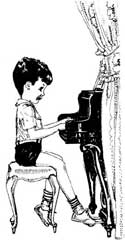|
|
Serving Richmond Hill, Thornhill, Markham and Vaughan, OntarioNear Yonge Street and Highway 7Telephone: (905) 707-5507 Email: cherempiano@gmail.com |
Why Invest in Piano Lessons for the Kids?Researchers find "neural circuitry" more developed in those who study music; when it comes to lessons...starting younger is betterPiano lessons have been a part of most children's lives for generations. Most of us remember having to come home after school to practice for an hour every day. Most of us hated it and were told, "You'll thank me later". Today, many New Age parents believe that it is better to allow the child to choose his or her own hobby or activity, and not force the child to do something he or she doesn't really want to do. Recent research, however, is showing that there was an unwitting reason that Mom or Dad forced us to sit at the piano and practice. Most of us have used the phrase "It's like riding a bicycle; you never forget" at one point or another. Research is showing that there is a reason that we never forget how to ride a bicycle. As a child is growing, the brain develops parts of the sensory cortex that are dedicated to physical skills, like riding a bicycle or playing a musical instrument. The following is from an article that appeared in the February 19, 1996 edition of Newsweek magazine. "Last October, researchers at the University of Konstanz in Germany reported that exposure to music rewires neural circuits. In the brains of nine string players examined with magnetic resonance imaging, the amount of somatosensory cortex dedicated to the thumb and fifth finger of the left hand-the fingering digits-was significantly larger than in nonplayers. How long the players practiced each day did not affect the cortical map. But the age at which they had been introduced to their muse did: the younger the child when she took up an instrument, the more cortex she devoted to playing it. Like other circuits formed early in life, the ones for music endure. Pediatric neuro-biologist Harry Chugani of Wayne State University played the guitar as a child, then gave it up. A few years ago he started taking piano lessons with his young daughter. She learned easily, but he couldn't get his fingers to follow his wishes. Yet when Chugani recently picked up a guitar, he found to his delight that "the songs are still there", much like the muscle memory for riding a bicycle. What does all this mean? It means that the time for your child to start learning the piano is right now. The learning window for music is between the ages of 3 and 10. Very few concert-level musicians begin playing later than the age of 10. It is much harder to learn an instrument as an adult. What can we as parents do about musical influence in our child's life? We can sing songs with our children and play structured, melodic music. If the child shows any musical aptitude or interest at all, get an instrument into his hands early. There are those who believe that music is not necessary for modern society, that it is a luxury for those who have the time, money and inclination for it. Every year we see the loss of more and more music and arts programs from the curriculum of our schools due to lack or reduction of funding from government and other sources. The fact is, history shows that as a society grows in knowledge and enlightenment, music and the rest of the arts push further and further into the forefront of society. The defining factor of a civilization itself is the level of the arts in its society, not only at the level of the player, but the level of the listener as well. Not every child will have the intrinsic ability to be another Liberace or Placido Domingo, but every child can be given the gift of responding to music on more than just an emotional level. Piano lessons, or music lessons of any kind, at an early age, will not only create abilities that the child will carry for the rest of his or her life, but will help to imprint a love of music that will be a defining characteristic in the child's personality and will help to establish the ability to discipline himself or herself for difficult tasks later in life. So when your child complains about having to practice, just smile and say, 'You'll thank me later'." Call us for a free consultation and evaluation at |
